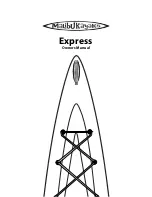
21
Safety
2
E
XTINGUISHE RS
The extinguishers are part of the compulsory equipment.
An extinguisher or a fire blanket shall be set less than 2 m from any flame appliance.
E xtinguishers must be placed less than 5 m from any berth.
It is compulsory for an extinguisher to be placed less than 2 m away from the extinguisher aperture of the engine compartment.
An extinguisher shall be less than 1 m from the steering station.
The extinguishers must be in position (see "E xtinguisher positions" diagram).
E xtinguisher, per unit, minimum capacity 5A/34B.
For the FIRST 35: 15A/102B(equivalent 3 extinguishers of this minimum capacity).
The engine compartment has an aperture that makes it possible to inject the extinguishing product inside without opening the
usual access hatches.
I
NSTRUCTIONS
TO
F OLLOW
IN
CASE
OF
A
F IRE
IN
THE
E NGINE
COMPARTME NT
BILGE
:
- Stop the engine.
- Switch off power and stop fuel supply.
- Block off the air supply from the air inlets and outlets of the engine.
- Inject the extinguishing product through the aperture.
- Wait.
- Open the access hatches and repair.
W
ARNING
-Do not obstruct the ways to the emergency
exits.
-Do not obstruct the safety controls (fuel oil
valves, gas valves, power switches).
-Do not block the extinguishers placed on
shelves.
-Do not leave the vessel unattended when a
cooker or heater is in use.
-Do not use gas lamps in the vessel.
-Do not alter the vessel systems (electrical, gas or
fuel).
-Do not fill up a tank or change a gas cylinder
when an engine is running or a cooker or heater
is on.
-Do not smoke while handling fuels or gas.
W
ARNING
-The
CO²
extinguishers shall be used only to
fight
electrical fires
.
-Clear the area immediately after use in order to
avoid suffocation.
-Air before entering.
Summary of Contents for FIRST 35
Page 1: ...FIRST 35 Code 091962 Owner s Manual ...
Page 2: ......
Page 4: ......
Page 7: ...3 Introduction HISTORY OF UPDATES Index A 08 2009 ...
Page 8: ......
Page 10: ......
Page 11: ...7 General specifications Technical specifications Certification Design category Your boat 1 ...
Page 26: ...22 Safety Use of the manual bilge pump Lay out of Operation ...
Page 28: ...24 Safety Acces to sector ...
Page 30: ......
Page 31: ...27 Hull Maintenance of the Hull Carreening 3 ...
Page 32: ...28 Hull Carreening Wetted area 27 5 m ...
Page 34: ......
Page 42: ......
Page 44: ......
Page 45: ...41 Steering system Steering Gear 5 ...
Page 46: ...42 Steering system Steering Gear ...
Page 47: ...Steering system 5 43 Detail B Detail C Detail D ...
Page 51: ...47 Rigging and Sails Standing rigging Running rigging Winches Sail setting Sails 6 ...
Page 52: ...48 Rigging and Sails Rigging Cruising DWL 1 2 3 4 5 ...
Page 54: ...50 Rigging and Sails Rigging Racing carbon DWL DWL 1 2 3 DWL 4 5 ...
Page 67: ...63 Fittings Introduction Interior maintenance Maintenance of fabrics 7 ...
Page 68: ...64 Fittings INTRODUCTION Fittings ...
Page 72: ......
Page 73: ...69 Water and sewage water Water tank Water system Distribution Water system Drainage Sewage 8 ...
Page 78: ......
Page 84: ......
Page 85: ...81 Electrical equipment General information 12 V DC system 110 220 VAC system Equipment 9 ...
Page 86: ...82 Electrical equipment Schematic diagram 12V T 30 ma 40A 220 Volts 50Hz ...
Page 98: ...94 Electrical equipment Electronics Transducer location View interior View Outside ...
Page 100: ......
Page 101: ...97 Engine General information Engine fitting 10 10 ...
Page 102: ...98 Engine Fuel tank Fuel filler Gauge Electrical panel Refer to the instructions for use ...
Page 104: ...100 Engine ENGINE FITTING ...
Page 105: ...101 Engine 10 10 ...
Page 106: ...102 Engine ...
Page 115: ...111 Launching Launching recommendations Stepping the mast 11 11 ...
Page 116: ...112 Launching POSITION OF HOISTING CRADLE AND STRAPS ...
Page 119: ...115 Winter Storage Laying up Protection and maintenance 12 12 ...
Page 120: ......
Page 122: ......
















































